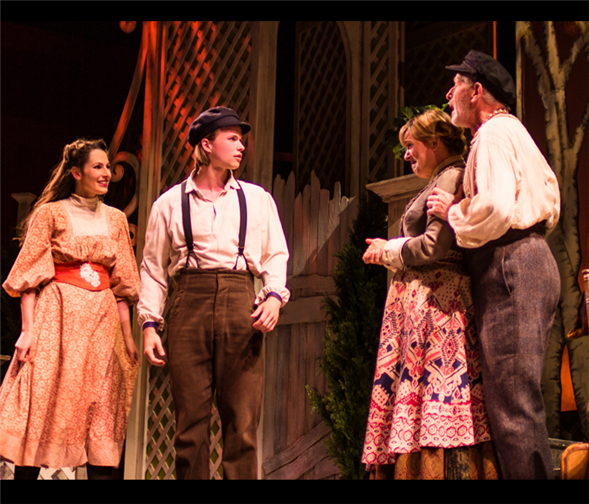Translate Page

The Golden Bride brings the history of musicals to life
---
If the 1923 musical The Golden Bride were being developed today, then someone would probably cut the song "A Greeting from the New Russia." Because really, it doesn't make sense in the show, or at least not in the way we expect a song to make sense.
With music by Joseph Rumshinsky, lyrics by Louis Gilrod, and a libretto by Frieda Freiman, The Golden Bride follows Goldele, a young Jewish woman in a Russian shtetl who learns she has inherited a fortune. This immediately inspires men to court her, and even though she has her heart set on her childhood friend Misha, she devises a contest to see who can win her hand. Eventually, the plot travels to New York City, where most of the characters immigrate, and a masked ball where Goldele and Misha must decide if they have a future together.
But just before the masked ball – just before the climax of the story – Misha pauses to sing "A Greeting from the New Russia," a hopeful ballad about the spirit of cooperation among Jews and Christians back home.
As lovely as it is, the number is a bit random. After all, no one was discussing these issues, and no one mentions them again. "There's no text to lead you there," says Bryna Wasserman, who's co-directing the musical's current Off-Broadway revival for the National Yiddish Theatre Folksbiene. "He's not singing about anything else in the story."
That's why, in a modern musical, the song would probably be history. We tend to snip away what feels like a distraction or a dead end.
But that's all the more reason to keep "A Greeting from the New Russia" in NYTF's production, which plays through August 28 at the Museum of Jewish Heritage.
Wasserman, who is also NYTF's executive director, says, "Part of our mission is keeping our culture alive and our language alive through the vehicle of performance. We're asking people to look back, to know the history of musical theatre. And to know the contribution that Yiddish artists – someone like Rumshinsky – have made."
{Image1}
That's why The Golden Bride is performed in Yiddish, for instance, just like when it became a smash hit of New York's thriving Yiddish theatre scene in the 1920s. (English and Russian supertitles are projected above the stage.) And that's also why "problematic" numbers like "New Russia" are kept in the show. What better way to understand this musical than to see it in its original form? (The scholar Michael Ochs has carefully reconstructed the libretto and the score.)
For one thing, experiencing the number in context teaches us how writers used to address the particular needs of their material. "An aria or a song could just be an excuse for changing the set behind it," Wasserman says. "You'd just pull a curtain across the stage and let someone sing while the next scene was set up. ["New Russia"] was a lead-in to the 'wow' moment of the masked ball."
It was something else, too. The way it's staged in this production – which played last winter and has returned due to popular demand – the song feels like a conversation between the artists and the audience. Cameron Johnson, who plays Misha, looks directly at us while he sings, and you can almost hear Rumshinsky and Gilrod talking to their original audience about the homeland.
Back in 1923, many of their patrons would've been Russian-Jewish immigrants themselves, and they might have loved a few moments to reflect on the people and places they'd left behind. They might have appreciated a tale of Jewish and Christian harmony, especially given what happened to Jewish communities in Russia.
So while it may not be connected to the plot, Misha's number adds enormous meaning to The Golden Bride. It underscores how this show understood and resonated with an entire community. In that light, cutting it seems out of the question. As Wasserman says, "The opportunity to impart this knowledge – this knowledge of the total contribution – is a privilege."
---
TDF Members: At press time, discount tickets were available to The Golden Bride. Go here to browse our latest offers.
Follow Mark Blankenship at @IAmBlankenship. Follow TDF at @TDFNYC.
Photos by Justin Scholar. Top photo (L to R): Rachel Zatcoff, Cameron Johnson, Lisa Fishman, and Bruce Rebold.